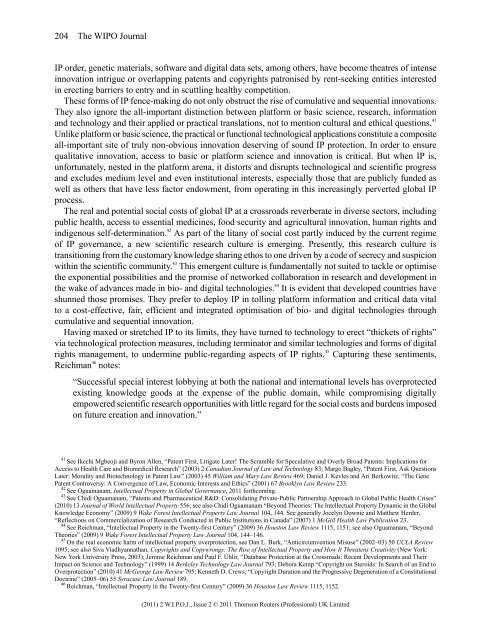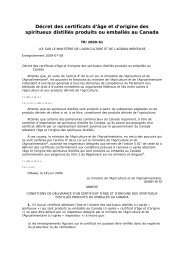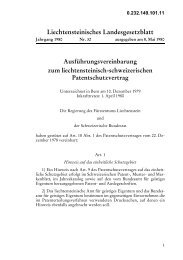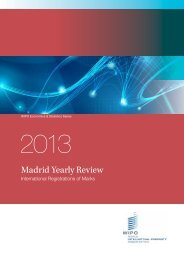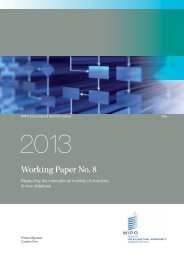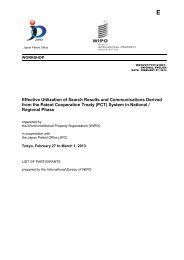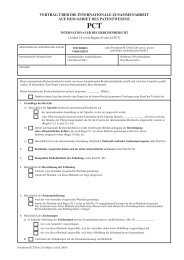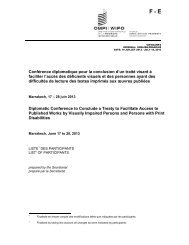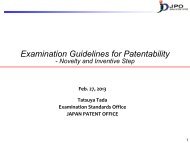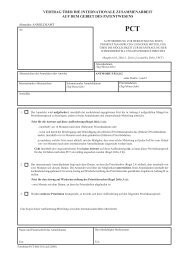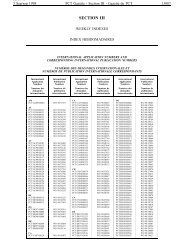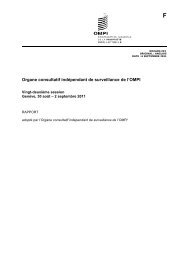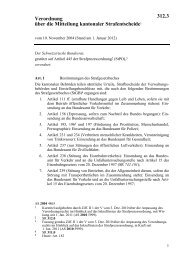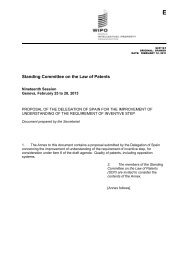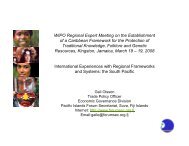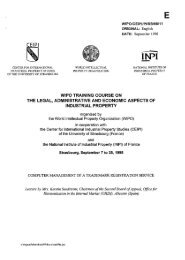WIPO Journal - World Intellectual Property Organization
WIPO Journal - World Intellectual Property Organization
WIPO Journal - World Intellectual Property Organization
You also want an ePaper? Increase the reach of your titles
YUMPU automatically turns print PDFs into web optimized ePapers that Google loves.
204 The <strong>WIPO</strong> <strong>Journal</strong><br />
IP order, genetic materials, software and digital data sets, among others, have become theatres of intense<br />
innovation intrigue or overlapping patents and copyrights patronised by rent-seeking entities interested<br />
in erecting barriers to entry and in scuttling healthy competition.<br />
These forms of IP fence-making do not only obstruct the rise of cumulative and sequential innovations.<br />
They also ignore the all-important distinction between platform or basic science, research, information<br />
and technology and their applied or practical translations, not to mention cultural and ethical questions. 41<br />
Unlike platform or basic science, the practical or functional technological applications constitute a composite<br />
all-important site of truly non-obvious innovation deserving of sound IP protection. In order to ensure<br />
qualitative innovation, access to basic or platform science and innovation is critical. But when IP is,<br />
unfortunately, nested in the platform arena, it distorts and disrupts technological and scientific progress<br />
and excludes medium level and even institutional interests, especially those that are publicly funded as<br />
well as others that have less factor endowment, from operating in this increasingly perverted global IP<br />
process.<br />
The real and potential social costs of global IP at a crossroads reverberate in diverse sectors, including<br />
public health, access to essential medicines, food security and agricultural innovation, human rights and<br />
indigenous self-determination. 42 As part of the litany of social cost partly induced by the current regime<br />
of IP governance, a new scientific research culture is emerging. Presently, this research culture is<br />
transitioning from the customary knowledge sharing ethos to one driven by a code of secrecy and suspicion<br />
within the scientific community. 43 This emergent culture is fundamentally not suited to tackle or optimise<br />
the exponential possibilities and the promise of networked collaboration in research and development in<br />
the wake of advances made in bio- and digital technologies. 44 It is evident that developed countries have<br />
shunned those promises. They prefer to deploy IP in tolling platform information and critical data vital<br />
to a cost-effective, fair, efficient and integrated optimisation of bio- and digital technologies through<br />
cumulative and sequential innovation.<br />
Having maxed or stretched IP to its limits, they have turned to technology to erect “thickets of rights”<br />
via technological protection measures, including terminator and similar technologies and forms of digital<br />
rights management, to undermine public-regarding aspects of IP rights. 45 Capturing these sentiments,<br />
Reichman 46 notes:<br />
“Successful special interest lobbying at both the national and international levels has overprotected<br />
existing knowledge goods at the expense of the public domain, while compromising digitally<br />
empowered scientific research opportunities with little regard for the social costs and burdens imposed<br />
on future creation and innovation.”<br />
41 See Ikechi Mgbeoji and Byron Allen, “Patent First, Litigate Later! The Scramble for Speculative and Overly Broad Patents: Implications for<br />
Access to Health Care and Biomedical Research” (2003) 2 Canadian <strong>Journal</strong> of Law and Technology 83; Margo Bagley, “Patent First, Ask Questions<br />
Later: Morality and Biotechnology in Patent Law” (2003) 45 William and Mary Law Review 469; Daniel J. Kevles and Ari Berkowitz, “The Gene<br />
Patent Controversy: A Convergence of Law, Economic Interests and Ethics” (2001) 67 Brooklyn Law Review 233.<br />
42 See Oguamanam, <strong>Intellectual</strong> <strong>Property</strong> in Global Governance, 2011 forthcoming.<br />
43 See Chidi Oguamanam, “Patents and Pharmaceutical R&D: Consolidating Private-Public Partnership Approach to Global Public Health Crises”<br />
(2010) 13 <strong>Journal</strong> of <strong>World</strong> <strong>Intellectual</strong> <strong>Property</strong> 556; see also Chidi Oguamanam “Beyond Theories: The <strong>Intellectual</strong> <strong>Property</strong> Dynamic in the Global<br />
Knowledge Economy” (2009) 9 Wake Forest <strong>Intellectual</strong> <strong>Property</strong> Law <strong>Journal</strong> 104, 144. See generally Jocelyn Downie and Matthew Herder,<br />
“Reflections on Commercialization of Research Conducted in Public Institutions in Canada” (2007) 1 McGill Health Law Publication 23.<br />
44 See Reichman, “<strong>Intellectual</strong> <strong>Property</strong> in the Twenty-first Century” (2009) 36 Houston Law Review 1115, 1151; see also Oguamanam, “Beyond<br />
Theories” (2009) 9 Wake Forest <strong>Intellectual</strong> <strong>Property</strong> Law <strong>Journal</strong> 104, 144–146.<br />
45 On the real economic harm of intellectual property overprotection, see Dan L. Burk, “Anticircumvention Misuse” (2002–03) 50 UCLA Review<br />
1095; see also Siva Viadhyannathan, Copyrights and Copywrongs: The Rise of <strong>Intellectual</strong> <strong>Property</strong> and How It Threatens Creativity (New York:<br />
New York University Press, 2003); Jerome Reichman and Paul F. Uhlir, “Database Protection at the Crossroads: Recent Developments and Their<br />
Impact on Science and Technology” (1999) 14 Berkeley Technology Law <strong>Journal</strong> 793; Debora Kemp “Copyright on Steroids: In Search of an End to<br />
Overprotection” (2010) 41 McGeorge Law Review 795; Kenneth D. Crews, “Copyright Duration and the Progressive Degeneration of a Constitutional<br />
Doctrine” (2005–06) 55 Syracuse Law <strong>Journal</strong> 189.<br />
46 Reichman, “<strong>Intellectual</strong> <strong>Property</strong> in the Twenty-first Century” (2009) 36 Houston Law Review 1115, 1152.<br />
(2011) 2 W.I.P.O.J., Issue 2 © 2011 Thomson Reuters (Professional) UK Limited


